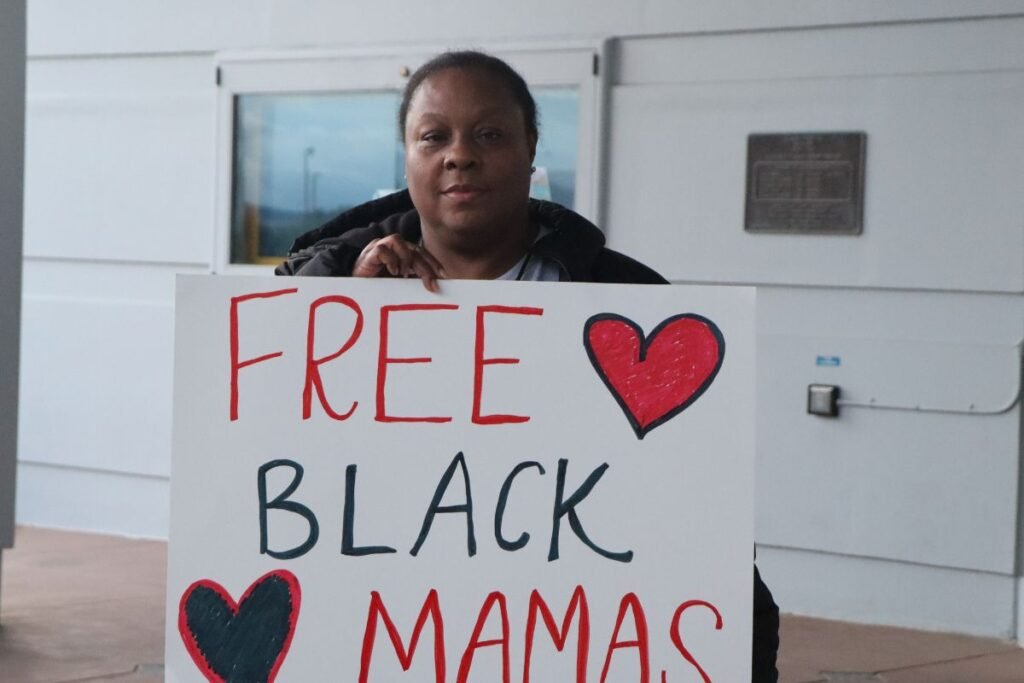
A new report from Essie Justice Group (Essie), a nonprofit based in Oakland, CA, that supports women with incarcerated loved ones, shares lessons learned through its campaign focused on bailing Black mothers out of jail. Women make up the fastest-growing incarcerated population in the United States; and one in four women and one in two Black women have an incarcerated loved one. Over the past decade, Essie has led efforts to combat this issue statewide.
Essie is part of the National Bail Out collective, a coalition launched in 2017 as the first mass bailout action in modern history. Since then, the coalition has helped lead the Black Mama’s Bail Out Campaign, which not only covers bail but also builds long-term support systems for women impacted by incarceration. Thus far, as the report describes, Essie has bailed out 17 Black women from across California since 2017.
The group typically bails out one to three women per year who represent a range of experiences, needs, and circumstances. They are mothers, grandmothers, and young women with caregiving responsibilities. Essie’s new report, The Hidden Heart of Reentry, shares key lessons from this work and sheds light on the harm caused by pretrial detention.
Responding to a Broken System
As the report notes, women, and Black women in particular, are disproportionately harmed by pretrial detention. Yet, “much of the discourse around bail reform lacks a gendered analysis that recognizes how women, particularly Black women, are uniquely impacted.” Across the country, 60 percent of women incarcerated pretrial are legally innocent, but cannot afford their bail amount. Compounding this is the impact that pretrial incarceration has on children—80 percent of women in jail are mothers.
“Much of the discourse around bail reform lacks a gendered analysis that recognizes how women, particularly Black women, are uniquely impacted.”
In California, the harm is particularly pronounced because the median bail amount is $50,000—more than five times the national average. Because the high bail amounts often exceed the average Black woman’s yearly income, many cannot quickly post their bail, leading to prolonged periods of pretrial incarceration that disrupts employment, and other financial struggles. Those who do manage to pay are often more financially burdened afterward.
“The existing pretrial and money bail system means that Black women must choose between life-altering debt and incarceration,” the report reads. For Essie, these bailouts are one way to shed light on and tackle this systemic problem.
The report highlights four critical lessons from the organization’s bailout work:
- Leadership from people with direct experience in the criminal legal system matters in reentry.
- Bailout processes vary by jurisdiction and are not always clear.
- Public defenders are critical to successful bailouts.
- Court support can make positive impact on case outcomes.
As the report describes, before the actual bailout takes place, the group identifies eligible Black women, often through recommendations from public defenders. Essie staff then conduct a needs assessment, during which they learn about the woman’s immediate needs and the resources available within the community. For many of the women, the report notes, this is the first time someone has asked them what their needs were.
“The existing pretrial and money bail system means that Black women must choose between life-altering debt and incarceration.”
The report outlines how bailing women out of jail is a coordinated effort that often requires rapid response and quick thinking. For instance, in one case, Essie members showed up to post the $250,000 bail of one woman, only to learn that a separate check was required for each charge. Members had to make the 90-minute round trip quickly to secure the separate cashier’s checks, as the woman’s family excitedly waited outside. For Essie members, it was all worth it when they were finally able to see the woman reunited with her children.
This example reflects the group’s observation that the bailout process is sometimes intentionally made more difficult by jail staff to further delay a person’s release. In response, Essie is aiming to formalize its bailout procedures to “create a standardized protocol that incorporates the lessons learned over the years, ensuring that their approach remains efficient, informed, and resilient in the face of obstacles.”
Supporting Successful Reentry
It is also crucial to ensure women have access to the necessary support services after their release. As Essie outlines in the report, successful bailouts also include providing court and reentry support for after their release, and advocacy to connect this initiative to the group’s broader efforts to end money bail.
The report notes that when Essie first initiated its bailouts nearly 10 years ago, the organization did not initially offer needs assessments or coordinated services, which led to some challenges, such as losing contact with bailed-out individuals due to unstable housing or a lack of support. During this time, two of the four women whom Essie bailed out missed their court appearances, resulting in bail forfeiture.
“When tied to an active campaign, bail outs can generate public momentum, provide an opportunity for direct actions, and bring attention to critical issues.”
By 2019, the group had begun to emphasize the need for comprehensive support. Now, the group’s reentry goals include meeting basic needs immediately after incarceration, providing support from staff and membership, providing connections to temporary housing, assisting in acquiring permanent housing, providing support for post-incarceration needs like employment referrals and childcare, and supporting Black women through their reintegration into the community.
This type of support has been transformative. One of the Black mamas noted, “In the two months since I’ve been out, having access to care has changed my life. I have supportive housing, I’m in counseling, I’m enrolled in Essie’s Healing to Advocacy Program. I’m working. I’m enjoying time with my baby. And just last week, a judge terminated my probation a year early because it was clear what an impact care was having.”
In 2022, Essie began offering stipends—$750 per month allocated to each mother. Specifically, this includes $350 for them to use as they see fit, $300 that Essie used to purchase items such as groceries and toiletries for the women, and $100 set aside for court transportation.
The women have noted how this stipend has helped them, especially when they are between jobs. As justice-impacted people, they are already facing barriers that make reacclimating to society harder, and small supports like these can make a big difference. Essie recognizes that bailing these women out of jail is not going to tear down the system of mass incarceration, but it is a start—and a tool within the group’s broader effort toward systemic change.
As the report points out, “When tied to an active campaign, bail outs can generate public momentum, provide an opportunity for direct actions, and bring attention to critical issues like pretrial detention and the lack of comprehensive care infrastructure.”














